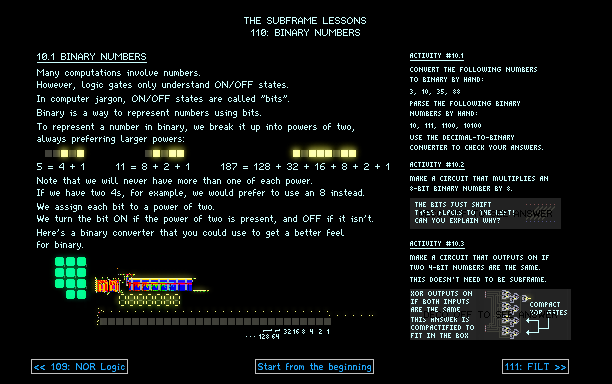SL110: Binary Numbers by mark2222

Quick crash-course to binary numbers! This will be the last one in a while.
2147483647
60hz
math
electronic
electronics
number
guide
tutorial
lesson
subframe
Comments
-
Security-Drone 11th Mar 2018
 I suppose a lesson on logic gates and combinations wouldn't be out of favour... I need to touch up a little on electronics.
I suppose a lesson on logic gates and combinations wouldn't be out of favour... I need to touch up a little on electronics. -
mark2222 10th Mar 2018
 @NoVIcE I'm not sure how much of my target audience really needed the last two lessons (or the next one), but I'm trying to assume very little prior knowledge for this series. And it would be hard to talk about FILT logic and column design without building on binary numbers and addition. (By the way, do you know if there are any column design circuits simpler than addition/bitshift?)
@NoVIcE I'm not sure how much of my target audience really needed the last two lessons (or the next one), but I'm trying to assume very little prior knowledge for this series. And it would be hard to talk about FILT logic and column design without building on binary numbers and addition. (By the way, do you know if there are any column design circuits simpler than addition/bitshift?) -
mark2222 10th Mar 2018
 @DoomDuck Ah, I see. Yeah, this lesson is actually part of a broader series of lessons, and a XOR gate was already introduced in the previous lesson. The focus isn't really on classical electronics, though, so instead of constructing one from scratch, you would have constructed one out of NOR gates that I provided. But yeah I can see how the last activity feels abruptly different if you did this one first. By the way, thanks! Though there are definitely more compact ways to design a XOR gate ;)
@DoomDuck Ah, I see. Yeah, this lesson is actually part of a broader series of lessons, and a XOR gate was already introduced in the previous lesson. The focus isn't really on classical electronics, though, so instead of constructing one from scratch, you would have constructed one out of NOR gates that I provided. But yeah I can see how the last activity feels abruptly different if you did this one first. By the way, thanks! Though there are definitely more compact ways to design a XOR gate ;) -
NoVIcE 10th Mar 2018
 With the inclusion of the last 2 lessons, the content became a bit broader than this series' name. But nevermind, it is very helpful!
With the inclusion of the last 2 lessons, the content became a bit broader than this series' name. But nevermind, it is very helpful! -
DoomDuck 10th Mar 2018
 @mark2222: i know what an XOR gate does but i have the lest idea of what it made out of the stuff there. Btw ur gates look xompact and awesome especially with the labels which helps alot
@mark2222: i know what an XOR gate does but i have the lest idea of what it made out of the stuff there. Btw ur gates look xompact and awesome especially with the labels which helps alot -
optimus2006 10th Mar 2018
 P.S use blob display (5) to see the numbers on ehte pad. Otherwise it looks like sticks.
P.S use blob display (5) to see the numbers on ehte pad. Otherwise it looks like sticks. -
mark2222 10th Mar 2018
 @wisecase2 Yes, that's what the binary display in this save does, except, if I remember correctly, with a carry-save stage at the start to optimize on space. You could try implementing one yourself! It'd be fun and instructive.
@wisecase2 Yes, that's what the binary display in this save does, except, if I remember correctly, with a carry-save stage at the start to optimize on space. You could try implementing one yourself! It'd be fun and instructive. -
wisecase2 10th Mar 2018
 I have a method that is x.(k+1) = 8x.k + 2x.k + new digit (4 bits) for convert decimal to binary by digits
I have a method that is x.(k+1) = 8x.k + 2x.k + new digit (4 bits) for convert decimal to binary by digits -
Nean 9th Mar 2018
 If someone downvotes this they are truly a moron, as even apes can pick up things like morse code and binary.
If someone downvotes this they are truly a moron, as even apes can pick up things like morse code and binary. -
Aamths 9th Mar 2018
 why people downvoted on this save ? is ''art -1'' HAHAHA +1
why people downvoted on this save ? is ''art -1'' HAHAHA +1